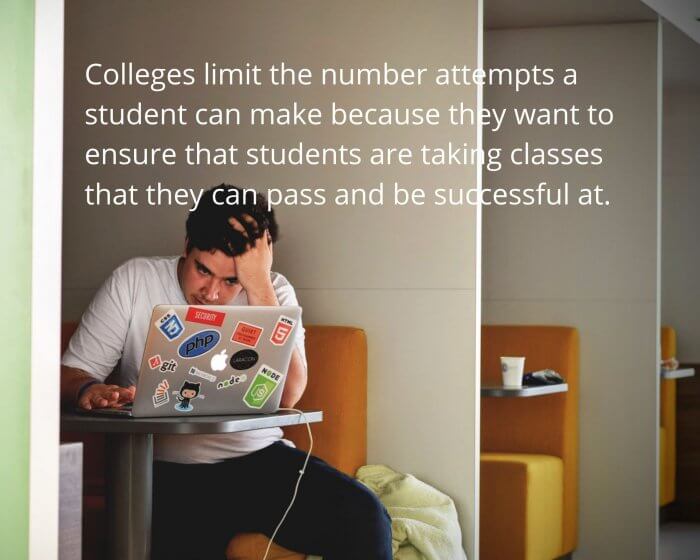Sometimes, your life events can distract you from your studies, making you fail a class. If this has happened to you already or if you are afraid that it’s going to happen, then you should know what the consequences are.
The first thing you should know is that if you have failed a class twice, your school might ask you to come back in the following year, making you redo the failed class. However, it is not so bad because if you failed twice, then it means that you failed two classes during your college career, which makes up for the previous one.
About the consequences of failing a class for the third time, this is when things might get serious. Most colleges and universities have rules that state that if you fail a class for the third time, you are not allowed to take classes anymore.
In this article we’ll look at what happens if you failed a class 3 times in college and what are your options if this happens to you.
Can I Take A Class Three Times In College?
Most colleges allow students to take a course twice without any requirements or limitations. However, after failing a class for the second time, extra restrictions will be placed on the student.
If your GPA is high enough, there is a good chance that you might be able to take a class three times. This will depend on the college’s policy regarding failed courses.
Some colleges have stricter rules and do not allow any students to take a course more than twice. So the first thing to do, is to find out your college’s policy on failed courses before your second failed attempt. It is important to be proactive and avoid any potential problems that could arise from failed courses.
How Many Times Can You Retake A Class In College?

Colleges limit the number attempts a student can make because they want to ensure that students are taking classes that they can pass and be successful at.
In most cases, you can only retake a failed class in college one time. If your second attempt will fail, you will likely need to speak with your college’s academic advisor about your options. The worst case scenario is when you will not be able to continue in that program or even complete your degree at the college.
However, if your school allows it, you may be able to retake it again (the 3rd or even the 4th time), but you probably will have to submit a petition to your college’s registrar office in order to be granted additional attempt.
Is It Bad To Have The Failure On Your Transcript?
If you failed a class in college, it might go on your transcript. This negatively affects your transcript, which in turn affects your GPA. A low GPA can make it very hard to graduate school of your choice.

Your transcript is a very important document when it comes to your college career. It shows all of the classes that you have taken and how well you did in them.
The chance of college success greatly decreases with each failed class on your transcript. When it comes to college, most people see a failed class as a red flag. It makes it seem like you’re not capable of succeeding in college courses.
Can An F Be Removed From My Transcript?
An F on your transcript can be a huge stain to your GPA. However, in some cases it is possible to remove this failed grade and replace it with a passing grade. This is a complicated process and requires a great deal of patience and proofread documentation, but sometimes it can be done.
Begin by checking with your professor to see if they will regrade the failed course. When your grade report for that failed class is issued, it will give you a failing grade. However, if your professor is willing to re-evaluate the failed coursework, they may change your grade when the new grade report is issued.
You also can try to retake the failed course, sometimes with different professor. If you can get a passing grade on the retaken course, then some colleges will allow you to replace the failed grade with the passing grade.
What If You Fail A Class In College With Financial Aid?
It’s getting more serious now. You’ve failed a class and you’re on the financial aid. What are the consequences?
If you’re receiving financial aid, you will most likely lose it. You will have to speak with your financial aid counselor to see what other options are available to you. These options could include retaking a class at a community college to replace the failed class, or getting a tutor.
Some grants are based on GPA requirement, so if you can’t maintain a certain GPA, you will lose your grant. Other financial aid programs, such as work-study, may also be discontinued.
You will also need to inform your academic advisor and the Registrar’s office about your situation. They will help you figure out what to do next and how to get back on track (if it’s possible).
How Many Classes You Can Fail In College Before You Get Kicked Out?
Usually, if your GPA is low, you will be asked to take a semester off or you might even get dismissed from college. Sometimes the rules are stricter with certain universities depending on the major you have chosen. For example, some medical schools will dismiss you if you get below a 2.0 GPA.
It is important to note that in most cases a college will not automatically dismiss you after you fail a class. It is possible to change your circumstances and maintain the opportunities you have previously worked for.
The policy on how many classes you can fail before getting kicked out will vary based on the school and program. It is important to look into the rules and regulations of your college or university for this answer.
Conclusion
College is a time of exploration and self-discovery. But if you failed a class 3 times, it can be devastating to your GPA and future college prospects. This is why you should always pay attention in class and never let anything distract you from your studies.
If failed a class 3 times, it seems like you would automatically be kicked out of college. However, this is not always the case. Depending on your GPA and the school you are attending, you might be allowed to stay. It is best to look into the regulations of your school for guidance on this issue.
It’s time to face the consequences and find a way to get back on track. Talk to your teachers, counselors, and parents to see what can be done. There is always a way to get back in shape and continue your education.

